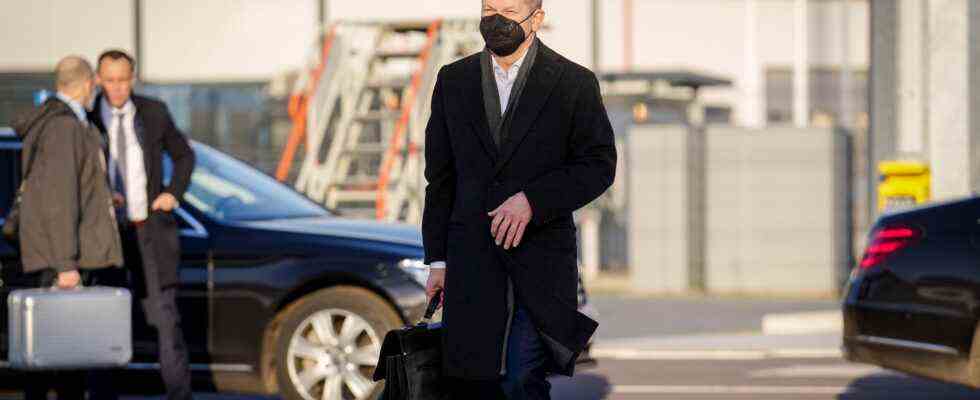Status: 02/15/2022 05:13 a.m
For Chancellor Scholz, it is the most difficult stage of his shuttle diplomacy in the Ukraine conflict: the inaugural visit to President Putin. It could be the last chance to prevent an escalation.
It’s no ordinary inaugural visit with the usual exchange of pleasantries. Because after US secret services warned of a Russian attack on Ukraine this week, Chancellor Olaf Scholz’s visit to Russian President Vladimir Putin could be the last chance to prevent an escalation.
Scholz travels to Putin with a dual strategy: on the one hand, signal a willingness to talk, on the other hand, issue a clear warning that the West would punish Russia severely for an attack on Ukraine. “We will then act. And there will be very far-reaching measures that would have a significant impact on Russia’s economic development opportunities,” said Scholz.
Don’t give away too much information
The Chancellor deliberately does not want to publicly speculate about what penalties that would be. Scholz calls it “strategic ambiguity”. Putin is said not to know exactly what sanctions threaten his country.
Scholz did not use the term “Nord Stream 2” in Kiev either. But in a one-to-one conversation with Putin, he will leave no doubt that the pipeline would be dead after an attack on Ukraine. The worst punishment for Russia would be exclusion from the international payment system “Swift”. However, this would also hit Western financial institutions hard.
Scholz: NATO membership is currently not an issue
A day before his visit to Moscow, Scholz left no doubt in Kiev that Germany stands in solidarity with Ukraine. So Scholz announced further financial support in three million euros. In addition, it is being checked whether the Bundeswehr can supply night vision devices or mine clearance devices, for example.
The Chancellor’s promise to the Ukrainians was also a signal to Putin. A message is very important to him, said Scholz. Germany is “very close” to Ukraine.
Following his dual strategy, Scholz also took a step towards Putin in Kiev. Ukraine’s NATO accession, feared by Russia, is currently not an issue, said Scholz. “That’s why it’s a bit strange to see the Russian government making something that is practically not on the agenda the subject of major political problems.”
Key to de-escalation?
Ukrainian President Volodymyr Zelenskyy said his country wanted to join NATO, but admitted with disappointment that nobody knew when that would happen. It may remain “a dream”.
Experts see this as a possible key to de-escalation: the NATO members do not fundamentally rule out Ukraine’s accession, but they make it clear that this is unrealistic in the foreseeable future.
Coincidentally or not: a day before Scholz’s visit, more conciliatory tones came from Moscow. After a meeting with his foreign minister, Putin signaled that he was ready for further talks. If negotiations were actually continued in the next few weeks and the attack feared by the secret services did not materialize, Scholz’s shuttle diplomacy would have been worthwhile.
Scholz travels to Putin in Moscow
Martin Ganslmeier, ARD Berlin, February 14, 2022 at 8:59 p.m

